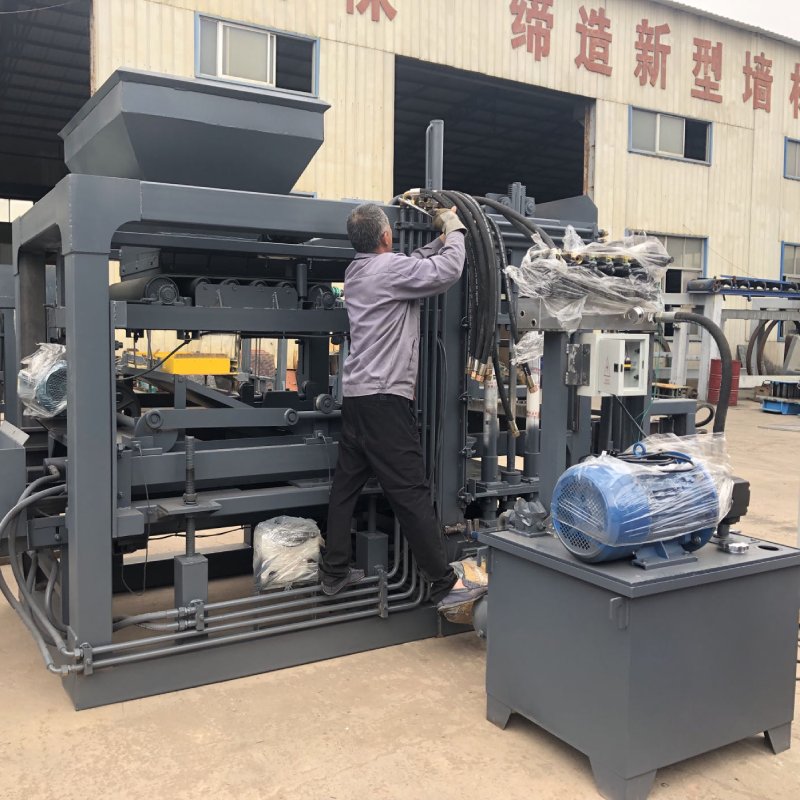
Image source Aiwei Block Machine
Choosing the Right Block Brick Making Manufacturer: A Comprehensive Guide
Introduction
The choice of a block brick making manufacturer is a crucial decision that can significantly impact the success of your construction project. Whether you are a builder, contractor, or entrepreneur, selecting the right manufacturer can mean the difference between smooth operations and costly delays. In this comprehensive guide, we will explore the essential factors to consider when choosing a block brick making manufacturer, ensuring you make an informed decision that aligns with your project’s goals and requirements.
Chapter 1: Understanding Your Project Needs
Section 1.1: Project Scope and Scale
Before delving into the manufacturer selection process, it’s essential to have a clear understanding of your project’s scope and scale. This includes determining the volume of blocks or bricks required, the project timeline, and any specific design or quality requirements. Whether it’s a small residential construction project or a large-scale commercial endeavor, project specifications will influence your choice of manufacturer.
Section 1.2: Material and Environmental Considerations
Consider the type of material you intend to use for block or brick production. Are you focused on traditional clay bricks, concrete blocks, or alternative materials? Additionally, take into account any environmental considerations, such as sustainability goals or the availability of locally sourced materials.
Chapter 2: Researching Potential Manufacturers
Section 2.1: Industry Reputation and Experience
Research the reputation and experience of potential block brick making manufacturers. Look for companies with a proven track record in producing high-quality products and providing reliable service. Seek out reviews and testimonials from past clients to gauge customer satisfaction.
Section 2.2: Product Range and Specialization
Evaluate the manufacturer’s product range and specialization. Do they offer the specific type of block or brick making machinery you need? Consider whether they cater to your project’s unique requirements, such as custom shapes or sizes.
Section 2.3: Innovation and Technology
Explore the manufacturer’s commitment to innovation and technology. Are they at the forefront of industry advancements, such as automation, sustainability, and digitalization? Cutting-edge technology can improve efficiency and product quality.
Section 2.4: Sustainability Practices
Assess the manufacturer’s sustainability practices. Look for companies that prioritize environmentally friendly manufacturing processes, including the use of recycled materials and energy-efficient machinery. Sustainability aligns with modern construction trends and regulatory requirements.
Chapter 3: Evaluating Technical Specifications
Section 3.1: Machine Capacity and Output
Examine the technical specifications of the block or brick making machines offered by the manufacturer. Consider factors such as production capacity, cycle times, and output rates. Ensure that the machinery can meet your project’s volume requirements.
Section 3.2: Quality Control and Consistency
Investigate the manufacturer’s quality control measures. High-quality bricks and blocks are essential for structural integrity and longevity. Check if the machinery can consistently produce uniform and durable products.
Section 3.3: Maintenance and Support*
Inquire about the manufacturer’s maintenance and support services. Regular maintenance is crucial for the longevity of machinery. Determine if the manufacturer offers training, spare parts availability, and technical support.
Chapter 4: Cost Analysis and Budgeting
Section 4.1: Initial Investment Costs
Calculate the initial investment costs associated with purchasing block or brick making machinery. Request detailed price quotes from potential manufacturers, including the machinery’s cost, shipping, and installation expenses.
Section 4.2: Operating and Maintenance Costs
Consider the long-term operating and maintenance costs. This includes factors such as energy consumption, labor requirements, and maintenance expenses. Opt for machinery that offers a balance between upfront costs and long-term savings.
Chapter 5: Warranty and After-Sales Service
Section 5.1: Warranty Coverage
Examine the manufacturer’s warranty coverage for their block or brick making machinery. A comprehensive warranty can provide peace of mind and protect your investment. Pay attention to warranty duration and coverage terms.
Section 5.2: After-Sales Support*
Evaluate the manufacturer’s after-sales support. Prompt and effective support is essential in case of technical issues or maintenance requirements. Ensure that the manufacturer has a responsive customer support team.
Chapter 6: Assessing Supplier Reliability
Section 6.1: Supplier Location and Accessibility*
Consider the geographical location of the manufacturer. Proximity to your project site can reduce transportation costs and lead times. Accessibility to the manufacturer’s facilities for inspections and training is also advantageous.
Section 6.2: References and Client Feedback*
Request references from the manufacturer and contact past clients. Inquire about their experiences with the manufacturer’s products and services. Client feedback can provide valuable insights into the supplier’s reliability.
Chapter 7: Regulatory Compliance and Certification
Section 7.1: Regulatory Compliance*
Ensure that the manufacturer’s products and processes comply with local and international regulatory standards for safety, quality, and environmental impact. Compliance is essential to avoid legal issues and project delays.
Section 7.2: Certification and Quality Standards*
Look for manufacturers that hold relevant certifications and adhere to quality standards specific to the block and brick making industry. Certifications can serve as an indicator of product reliability and consistency.
Chapter 8: Making the Informed Decision
Section 8.1: Comparative Analysis*
Conduct a comparative analysis of the information gathered from potential manufacturers. Create a matrix that outlines each manufacturer’s strengths, weaknesses, and alignment with your project needs.
Section 8.2: Site Visits and Demos*
Whenever possible, schedule site visits to the manufacturer’s facilities to inspect machinery and observe production processes. Request product demonstrations to assess the equipment’s performance.
Section 8.3: Negotiation and Finalization*
Initiate negotiations with the selected manufacturer. Clarify pricing, warranty terms, delivery schedules, and any additional requirements. Ensure that all aspects of the agreement are documented in a comprehensive contract.
Conclusion
Choosing the right block brick making manufacturer requires careful consideration of project needs, extensive research, and thorough evaluation of technical specifications, costs, after-sales support, and supplier reliability. By following the steps outlined in this comprehensive guide, you can make an informed decision that aligns with your construction project’s objectives, ensuring the successful production of high-quality bricks and blocks for your endeavors.
